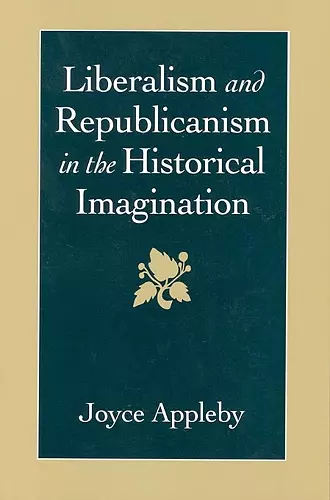Liberalism and Republicanism in the Historical Imagination
Format:Paperback
Publisher:Harvard University Press
Published:31st Mar '92
Currently unavailable, and unfortunately no date known when it will be back

This superb collection will have a major influence on our understanding of early American history. -- Gordon S. Wood, Brown University
Follows the labyrinthine controversies that the two perspectives of liberalism and republicanism have generated in their day and in current times. Appleby addresses the tensions that remain to be resolved in the democratic societies of the late 20th century.
Like dye cast into water, liberal assumptions color everything American, from ideas about human nature to fears about big government. Not the dreaded “L” word of the 1988 presidential campaign, liberalism in its historical context emerged from the modern faith in free inquiry, natural rights, economic liberty, and democratic government. Expressed in the nation-building acts of revolution and constitution-writing, liberalism both structured and limited Americans’ sense of reality for two centuries.
The nation’s scholars were unable to break away from liberalism’s pervasive hold on the American mind until the last generation—when they recovered the lost world of classical republicanism. Ornate, aristocratic, prescriptive, and concerned with the common good, this form of republicanism held sway among the founding fathers before the triumph of liberal thought, with its simple, egalitarian, rational, and individualistic emphasis. The two concepts, as Joyce Appleby shows, posed choices for eighteenth-century thinkers much as they have divided twentieth-century scholars.
Entering one of the liveliest debates in the scholarly world about our ideological roots, Appleby follows the labyrinthine controversies that these two perspectives have generated in their day and in ours. In doing so, she addresses the tensions that remain to be resolved in the democratic societies of the late twentieth century—the complex relations between individual and community, personal liberty and the common good, aspiration and practical wisdom.
This is a superb collection of essays. Appleby is the foremost critic of the so-called ‘republican synthesis’ that has come to pervade a number of disciplines besides history… The debate over republicanism is still very much alive and her essays reveal a sharp and shrewd analytical mind ideally equipped for argument. These pieces are less traditional reconstructions of the past and more historical polemics, and as polemics they have had and will continue to have a major influence on our understanding of early American history. -- Gordon S. Wood, Brown University
Joyce Appleby is one of the most subtle intellectual historians at work these days, and the essay is the art form that comes most comfortably to her… Read together, one is impressed by the steadiness and force of her writing style. These essays position Joyce Appleby as an intellectual historian who has carved out a space between what she calls ‘The Cambridge School’—Pocock, Skinner, et al.—and the older tradition which concentrated on Locke and Hobbes largely abstracted from the social context in which they lived. Appleby is exemplary in her insistence that we search for the economic context in which some thoughts about government seem persuasive and in which others do not; she is sensitive to class as few intellectual historians are. -- Linda K. Kerber, University of Iowa
ISBN: 9780674530133
Dimensions: 229mm x 152mm x 23mm
Weight: 522g
364 pages